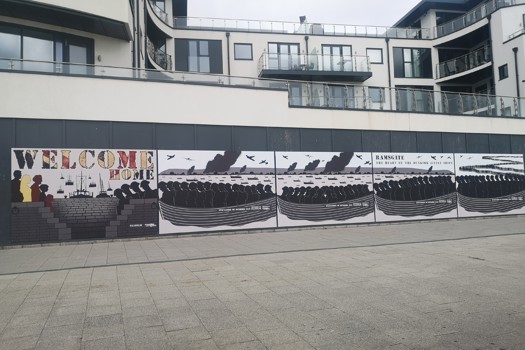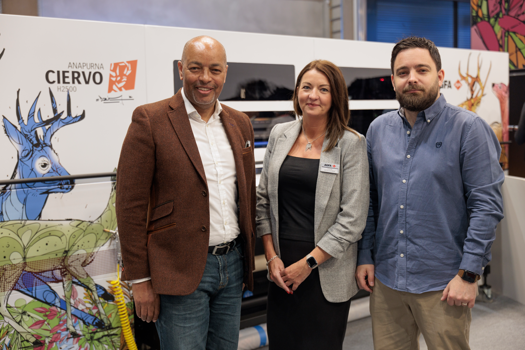Switching from bombs to brochures is perhaps not the most obvious move for a company to make, in terms of the kinds of products it handles, but this is exactly the trade-in made by brothers George and Lesley Sleight in the 1950s. They decided to pack in the haulage business they’d been running successfully during the war – transporting munitions and bomb-making components, among other things, up and down the country – to take on a family print business in Hull.
The brothers were motivated by the fact that, along with several other sectors, the haulage industry was being nationalised by the government, reports current director of the business Chris Sleight, grandson of George. He explains that the two brothers partnered with another brother, Raymond, who was already involved in the trade, and that the business, originally called H Pilling and Co and passed down to Chris Sleight’s father and then him and his brother David, has been in the family ever since.Today, the company serves its country in less dramatic ways, but, with Pilling Printers producing NHS customer information leaflets and casement folders, and health and safety labels and permit books – among the "real variety" of other promotional, stationery and POS work they also process – its contribution to the national good is still, most would agree, pretty worthwhile.
Critical to making this contribution, says Sleight, is the firm’s constant year-on-year investment drive, which over the past few years has seen it invest in a significant IT upgrade and acquire up-to-the-minute cutting, folding, bookletmaking and drilling equipment.
The latest investment has come in the form of a Ryobi 524GE B3 four-colour press, installed in January last year and joining another Ryobi, a four-colour Heidelberg GTO, a B2 Komori and single-colour GTO. The new press, which replaces a Heidelberg two-colour GTO, was bought in response to growing demand for colour work, reports Sleight.
"We were seeing people increasingly opt for colour, even for the more mundane items such as business forms," he says. "People are used to sitting in front of their computer, where everything is in colour, and putting colour logos on things. They’ll draft a design themselves and print it out and, of course, they print it all in colour and it looks really nice, so they want the volume versions of that business form in colour too."
This increase in demand for four-colour work was pushing Pilling’s capacity to its limits. The firm was having to turn work away or insist on longer turnarounds than today’s fast-paced marketplace would accept. "We’ve always been very competitive price-wise, but sometimes our lead times were not quick enough and people may have, I suspect, not been giving us the job due to that."
But that situation is now a thing of the past, thanks to the new Ryobi’s fast running speeds and rapid makereadies, says Sleight. "The three things that have most impressed us have been the print quality, speed of makeready and running speed; it runs consistently well at high speed," he says. "That’s all down to just having something that’s very new. In terms of the speed of makeready, that’s due to the automatic plate changing and the off-press controls."
Other options
While impressed with the Ryobi technology, Sleight doesn’t feel that his machine is necessarily unrivalled by similar kit from other manufacturers. "I don’t think there’s demonstrably that much difference between the manufacturers, I really don’t," he says, adding that the company also looked at machines from Sakurai and Komori when shopping for the new press. "I hear people say that one press is just so much better than another, but I don’t believe that – we’ve had Heidelbergs, Komoris and Rolands and in terms of print quality, there’s really not a lot in it."
What set the Ryobi apart from the competition in this instance was price and Ryobi supplier Apex Digital Graphics’ helpful approach, says Sleight. "When you’re investing quite a lot of money in something it’s down to the price of the machine and obviously the confidence you have in the people who are selling it," he says. "We were impressed with the way Apex handled the sale and viewings and that kind of thing – the customer service side of things."This helpful approach has continued on into the after-sales relationship between the two companies, says Sleight. Apex has helped Pillings solve a couple of minor teething problems with the new press, the bigger of which, reports Sleight, was an issue with the machine’s inking system. "We had one of the units coming off impression when it shouldn’t have been; it was a rogue pneumatic or electrical gremlin," he reports. "But the issues it caused weren’t that big; it was an intermittent fault. Apex invested quite a lot of time trying to resolve that for us, and they did a decent job, they sorted it out."
Sleight adds that in fact this initial problem was in all likelihood not a fault with the quality of the build and install on Ryobi and Apex’s part, but probably a result of disruption to the machine’s set-up caused by building work going on next door.
"At the same time the machine was installed and being commissioned, there was actually some fairly fundamental building work going on next door, with masonry and concrete falling down and jackhammers digging concrete up. So there was quite a lot of vibration coming through the building," he reports. "I don’t think it’s a coincidence that we had some teething issues while that work was going on.
Non-stop operation
This conviction is borne out by the fact that the press has proved very reliable ever since. "The machine hasn’t really stopped turning, we haven’t had much downtime at all," says Sleight.
With the ability to process more four-colour work and turnaround times slashed, Sleight is, then, one very happy customer. Faster turnarounds have also allowed the company to offer more competitive prices, something Sleight feels is ever-more important in today’s tough trading conditions.
"Colour has to be competitive and affordable," he says. "It’s allowing us to keep up with and ahead of the times. In this sort of environment, companies that aren’t investing in the latest equipment, as we’re doing, are going to find themselves slipping quite far behind in the long term."
"This is a great press for printers looking to take one or two steps up the ladder and move into serious colour work," adds Sleight of the justification for investing in this particular piece of kit to keep up with the crowd.
Sleight does concede though that ensuring Pilling Printers remains at the cutting edge of technology will soon involve embracing digital. "Digital is possibly the next stage that might start to play an increasing role for us and possibly supersede certain areas where we print litho," he says.
For now though, Sleight is confident that the Ryobi is speedy enough on long and mid-length runs to keep lucrative work coming through Pilling Printers’ doors. Investing in the very latest, quickest technology will always be the company’s first rule of thumb, says the director, in ensuring this continues to be the case.
So while the company may not deal in delivering bombs and munitions around the country anymore, it is, in the face of still-tough economic times, still putting up a good fight.
SPECIFICATIONS
Number of units 2, 4, 5
Max sheet size 520x375mm
Min sheet size 100x105mm
Max printing area 505x350mm
Max printing speed 11,000sph
Plate size 510x400mm
Feeding system Rotary stream feeder
Feeder pile capacity 600mm
Delivery pile capacity 400mm
Power consumption 13.5kW
Footprint 4.1x2m
Price £260,000
Contact Apex Digital Graphics, 01442 235236?www.apexdigital.co.uk
Company profile
Pilling Printers was born out of a haulage company operating before and during the Second World War. Brothers George and Lesley Sleight decided they’d had enough of this particular sector when it was nationalised in the 1950s, and teamed up with elder brother Raymond to buy Hull printer H Pilling and Co. The firm is today called Pilling Printers and is run by George’s grandsons: director Chris Sleight and his brother David, who is production manager. With its range of stationery, POS and commercial print products, the business services a whole range of public and private sectors, from pet food retailers to the NHS.
Why it was bought...
The firm decided to replace a two-colour Heidelberg GTO with a Ryobi 524GE B3 four-colour press in response to increased demand for colour work. The Ryobi was brought in, then, to complement the firm’s existing kit: another Ryobi, a Heidelberg four-colour GTO, a B2 Komori and single-colour GTO.
How it was performed...
The 524GE did experience a few teething problems just after install, but Sleight puts this down to the fact that vibrations from significant demolition work next door were occurring at the time. Praising supplier Apex Digital Graphics’ support with these issues, Sleight reports that the machine has been reliable ever since. "The three things that have most impressed us have been the print quality, speed of make-ready and the press running speed- it runs consistently well at high speed," he summarises.










